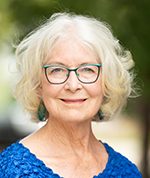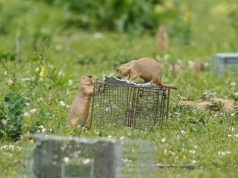
You might be surprised to know that Boulder, Colorado — 800-plus miles from the nearest ocean — has the highest number of SCUBA divers in the United States. Boulder is also home to the National Oceanic and Atmospheric Administration (NOAA), the Oceanic Preservation Society and a handful of marine biology and oceanography courses at University of Colorado Boulder.
We may love the mountains, but it seems we don’t ignore the environment we can’t see every day, and rightfully so: oceans affect weather patterns the world over. As a warming climate heats up ocean temperatures, the result is stronger tropical storms, the loss of important coral reef environments and rising sea levels that threaten to eradicate island nations and low-lying cities.
But while Boulder’s adults are working to save the oceans, there has been a recent movement afoot to help the next generation get involved in ocean education, whether it be through a summer camp, a school program or an educational book series.
Some school programs are ongoing throughout the year. The NOAA’s National Marine Sanctuaries office has a program crafted just for kids and their Ocean Guardian program provides funding for individual school projects that advocate environmental restoration and cleanup.
Naomi Pallock, the Ocean Guardian School program coordinator, says the program’s primary goal is to provide support for ocean stewardship projects suggested by schools. The Ocean Guardian program mostly provides financial support in addition to curriculum materials and activities that teachers in the program are allowed to pull from.
“It’s really the schools, the students, the teachers, and the administrators who do the hard work, the heavy lifting,” Pallock says. “They’re the ones that are implementing the projects, are participating, are affecting change either on the school campus or out in the communities. They’re the stars of the program. We just try to make it possible for them by giving them money and support when needed,” Pallock says.
The Watershed School is currently the only school in Boulder and all of Colorado hosting their own Ocean Guardian, but it hopefully will not be the last.
The Watershed School’s project is focused on waste reduction and reducing single-use plastics. Their proposal lists a goal of reducing school waste by 30 percent, as well as a cleanup of Boulder Creek. The Watershed School is collaborating with both the Colorado Ocean Coalition and Journeys, a local preschool.
The Ocean Guardian School program, now a national effort, continues to expand and instills both an inspiration and a hope in the younger generation. It is also an uplifting experience for the teachers and the organizers who get to watch the children help the environment with their own hands.
“The work that I have seen happen in schools and in the community has continued to amaze me,” Pallock says. “It really fills me, constantly, with a lot of hope that change is possible, that there is a growing awareness among these students of the value and importance of keeping our watersheds and oceans healthy.”
Other programs are summer-specific. University of Colorado’s Science Discovery program offers a summer camp called Ocean Discovery. The summer camp is for 5- to 6-year-old kids. For a $200 fee, parents get the chance to enroll their children in a program that teaches them about the ocean ecosystem.
The camp explores the underwater network, with lessons focusing on the natural mechanics behind waves, bioluminescence and deep-sea ecosystems. One of the program’s goals is to have children create a detailed ocean mural that the kids will get to add to everyday. Even more complicated topics will be simplified to give kids a better opportunity for learning.
Another summer camp running is Ocean First Swim’s Marine science and swim mini camp. This camp is a combination of knowledge-based and practical education where kids will learn about the ocean ecosystem and how undersea animals are affected by the things that people do to the ocean. This part of the program is accomplished through arts and crafts, storytelling and games.
While the first half of the program focuses on raising kids’ interest of the water, the second part gets them into the water. Swim instructors help raise kids’ confidence in and awareness of the water, as well as water safety.
Ocean First’s nonprofit, Ocean First Institute, also leads other educational ocean programs for kids, and the nonprofit has different outreach programs across Colorado to bring awareness of alternative lifestyles that could help the environment.
Lauren Riegler, the community outreach and volunteer coordinator for Ocean First Institute, says one of the goals of their programs is to make the kids aware of very simple changes that they can make to alter their lifestyle and in the process, help the environment.
The institute will also be hosting its own summer camp with schools; an effort that will be focused on creating underwater remotely operated underwater vehicles, or ROVs. Students get to put together ROVs from scratch and then use them in the Ocean First pool. The ROVs traverse obstacle courses and explore the deepest depths of the pool. The program teaches them new innovative ways to explore the ocean.
The organization also does expeditions and will take kids with them under certain circumstances to showcase the beauty of things under the ocean.
But even kids in a landlocked state can learn about the ocean and different ways to explore it. The reason the program’s outreach exists is to plant the seeds for curiosity in potential future marine biologists and ocean explorers.
“A big part of conservation is outreach and education,” Riegler says. “People are going to protect the things that they care about and they’re not going to care about things until we teach them about it. … We want to encourage them to explore and be curious about this other kind of world that might not be across the street from us, but we can still sort of explore it, even here in Colorado.”
While there are a number of programs right here in Boulder, the ocean education movement is happening around the nation, even outside of classroom-type experiences. Take Ocean Friends, published by Hatherleigh Press, for example. This newly published book is the first in a series that will highlight environmental advocacy and appreciation.
Andrew Flach, the publisher, says the book is meant for kids somewhere in between preschool and the second grade. Ocean Friends illustrates ecosystems of the ocean through beautiful color photographs and a simple narrative.
“The idea in the series, and the whole goal of the project, is to instill and inspire in the youngest of minds an appreciation and a value for all things on our planet, so that internally, we instill a spirit of stewardship at an early age,” Flach says.
Encouraging children to appreciate the environment is important, but the book’s scope isn’t limited to kids. Flach says the book is meant to be an experience for the whole family. The hope is that parents will share the books with their children and the kids will be inspired to find out more about ocean life.
Ocean Friends is part of a book series called KUBU, which is the Botswanan word for hippopotamus.
“The hippo is one of the fiercest and strongest animals in the animal kingdom … this magnificent, strong, powerful creature reminds all of us that we ourselves are strong and powerful as individuals. And together we can take on challenges respectfully and positively,” Flach says.
The book series will strive to create a positive relationship between the reader and the nature around them.
“If you don’t have a relationship, a positive relationship, how are you going to really want to do something to protect [nature] and care for it?” Flach asks. “We are so disconnected as a world, from the natural environment, in so many ways.”
As the first book in the series, Ocean Friends will hopefully provide a foundation for that progressive relationship. Oceans are an integral part of every environment, even when you can’t look outside the window and see an ocean right out in your backyard. Flach stresses that even in landlocked places like Colorado, ocean conservation is important.
“Every action we have has a consequence or a reaction. While you may be a thousand miles from the ocean, water is a finite resource. Keeping the water sources clean and pure is really important,” Flach says.
Ocean Friends, and the KUBU series, is a recent endeavor to market more environmental topics to kids. Flach says what separates Ocean Friends from other books that have a similar concept is the company’s intentions. Not only does Ocean Friends take a more unique approach to the ocean by using photographs rather than illustrations, it also endeavors to do something else: inspire.
“As we develop things further into the series and evolve our vision, it’s not really about education, it’s about inspiration,” Flach says. “We’re not providing materials for science class or science studies. Our goal is to provide experiences that captivate the emotion and the spirit and bring about a change that way.”
At the end of the day, advocating and educating kids about the ocean is essential, especially in our ever-changing environmental atmosphere. Though everyone has an impact on the environment, it is the youngest generation that will eventually spearhead movements to save it. It is a responsibility, but if it can be made enjoyable, then it can also be fun.
“Every environmental issue and the state of our world certainly falls on the younger generation… to keep the world as healthy as we can,” Pallock says. “The ocean is no exception and we have certainly seen over the years, that the ocean has been impacted by a lot of our actions on land.”
Respond: [email protected]














